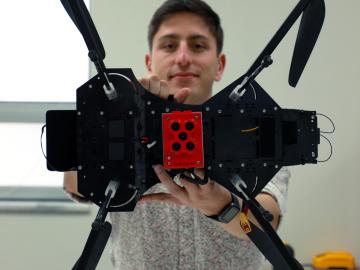Filter News
Area of Research
- (-) National Security (2)
- (-) Transportation Systems (1)
- Advanced Manufacturing (5)
- Biological Systems (2)
- Biology and Environment (7)
- Clean Energy (42)
- Climate and Environmental Systems (1)
- Data (1)
- Fossil Energy (1)
- Fusion and Fission (1)
- Isotope Development and Production (1)
- Isotopes (1)
- Materials (23)
- Neutron Science (18)
- Nuclear Science and Technology (6)
- Sensors and Controls (1)
- Supercomputing (17)
News Type
News Topics
Media Contacts
ORNL drone and geospatial team becomes first to map the Coca River in the Amazon basin as erosion and sediment threaten Ecuador’s lands.

Jack Orebaugh, a forensic anthropology major at the University of Tennessee, Knoxville, has a big heart for families with missing loved ones. When someone disappears in an area of dense vegetation, search and recovery efforts can be difficult, especially when a missing person’s last location is unknown. Recognizing the agony of not knowing what happened to a family or friend, Orebaugh decided to use his internship at the Department of Energy’s Oak Ridge National Laboratory to find better ways to search for lost and deceased people using cameras and drones.
It’s common knowledge that driving aggressively can dent gas mileage, but it’s difficult to determine exactly how much gas drivers waste. A new study by researchers at the Department of Energy’s Oak Ridge National Laboratory has quantified the impact speeding and slamming on the brakes has on fuel economy and consumption. They found that aggressive behavior behind the wheel can lower gas mileage in light-duty vehicles by about 10 to 40 percent in stop-and-go traffic and roughly 15 to 30 percent at highway speeds. This can equate to losing about $0.25 to $1 per gallon.




